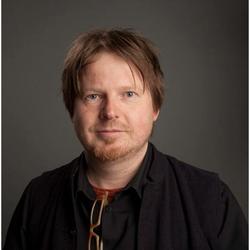Markus Berger

Markus Berger is an artist, designer, writer and researcher, but foremost a teacher. He is a registered architect (SBA) in the Netherlands and the founder and director of The Repair Atelier, a collaborative space to rethink and reuse discarded and broken objects and in the process, also “repair” the communities that form around them.
Berger holds a Diplomingenieur für Architektur from the Technische Universität Wien in Austria and has, since he graduated, worked, taught and lived in many parts of the world, which shaped his sensibility for ethics, aesthetics and values. His work, research, writing and teaching critiques conventional architectural thinking and practices and explores how art and design interventions can activate change in the built environment. Berger co-founded and co-edited Int|AR: The Journal on Interventions and Adaptive Reuse, which addresses such issues as preservation, conservation, alteration and interventions. His latest co-edited books are Intervention and Adaptive Reuse: A Decade of Responsible Practice (Birkhauser, 2021) and Repair: Sustainable Design Futures (Routledge, 2023).
Berger’s other published essays include Consumption: Use, Waste, Aesthetics and Repair in the US, which appeared in Upgrade: Making Things Better, edited by Silke Langenberg, ETH Zurich (Hanje Catz Verlag, 2023); and Death of the Architect: Appropriation and Interior Architecture (Routledge, 2018). Forthcoming essays include Repair: Sustainable Design Futures; Repairing Design: Damage, Care and Fragility; Imagination as an Act: Extended Realities in Interior Urbanism; An Interior Approach to Education and Adaptive Reuse; and Theorizing Interior Design: Identity, Practice, Education.
Berger serves on the editorial boards of the journals INTERIORITY (Indonesia) and SISU-LINE (Estonia).
Academic areas of interest
Forms of modification, transformation, intervention, reuse and repair are central to Berger’s research and work as an artist, architect, designer, editor and writer. Taking over something already existing (an ordinary object or another work of architecture or art) to make a new work initiates a whole set of radical potentialities. Repair and reuse unsettles ideas of single authorship, originality and authenticity established by traditional art history, and putting the “old” and the “new” together in inventive configurations sets into motion the many possibilities of recontextualization. Berger’s current work through the Repair Atelier engages discarded spaces, buildings, objects and materials by deconstructing and reinterpreting them to find new meaning, form and expression, rather than seeing them as unwanted or broken. The initial forms, uses and stories of these objects, as well as what was lost from them when they were discarded, are a central part of this critical inquiry. The process of reconstruction or remaking responds to these stories and inquiries and imbues each of them with an identity that is both its own as well as one shaped by the new and vital relationship.